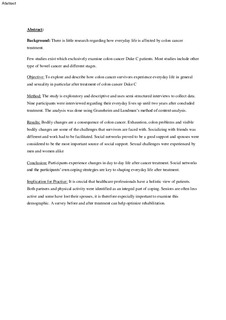| dc.contributor.author | Stuhlfauth, Susanne | |
| dc.contributor.author | Melby, Line | |
| dc.contributor.author | Hellesø, Ragnhild | |
| dc.date.accessioned | 2017-11-20T08:36:37Z | |
| dc.date.available | 2017-11-20T08:36:37Z | |
| dc.date.created | 2017-09-28T10:46:54Z | |
| dc.date.issued | 2017 | |
| dc.identifier.issn | 0162-220X | |
| dc.identifier.uri | http://hdl.handle.net/11250/2467063 | |
| dc.description.abstract | Background:
There is little research regarding how everyday life is affected by colon cancer treatment. Few studies exist that exclusively examine patients with Dukes C colon cancer. Most studies include other types of bowel cancer and different stages.
Objectives:
The aims of this study were to explore and describe how colon cancer survivors experience everyday life in general and sexuality in particular after treatment of Dukes C colon cancer.
Methods:
The study is exploratory and descriptive and uses semistructured interviews to collect data. Nine participants were interviewed regarding their everyday lives up until 2 years after concluded treatment. The analysis was done using Graneheim and Lundman’s method of content-analysis.
Results:
Bodily changes are a consequence of colon cancer. Exhaustion, colon problems, and visible bodily changes are some of the challenges that survivors are faced with. Socializing with friends was different, and work had to be facilitated. Social networks proved to be a good support, and spouses were considered to be the most important source of social support. Sexual challenges were experienced by men and women alike
Conclusion:
Participants experience changes in day-to-day life after cancer treatment. Social networks and the participants’ own coping strategies are key to shaping everyday life after treatment.
Implication for Practice:
It is crucial that healthcare professionals have a holistic view of patients. Both partners and physical activity were identified as an integral part of coping. Seniors are often less active, and some have lost their spouses, it is therefore especially important to examine this demographic. A survey before and after treatment can help optimize rehabilitation. | nb_NO |
| dc.language.iso | eng | nb_NO |
| dc.publisher | Lippincott, Williams & Wilkins | nb_NO |
| dc.title | Everyday Life After Colon Cancer: The Visible and Invisible Challenges | nb_NO |
| dc.type | Journal article | nb_NO |
| dc.type | Peer reviewed | nb_NO |
| dc.description.version | acceptedVersion | nb_NO |
| dc.source.journal | Cancer Nursing | nb_NO |
| dc.identifier.doi | 10.1097/NCC.0000000000000506 | |
| dc.identifier.cristin | 1499474 | |
| dc.description.localcode | © Lippincott, Williams & Wilkins. This is the authors' accepted and refereed manuscript to the article. | nb_NO |
| cristin.unitcode | 194,63,10,0 | |
| cristin.unitname | Institutt for datateknologi og informatikk | |
| cristin.ispublished | true | |
| cristin.fulltext | original | |
| cristin.qualitycode | 2 | |
